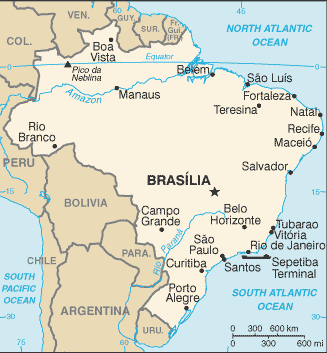 Amnesty International in a report issued Aug. 3 charges that Brazil's military police have been responsible for more than 1,500 deaths in Rio de Janeiro in the last five years, accusinf them of a "shoot first, ask questions later" policy. Amnesty released the findings ahead of the one-year countdown to the 2016 Rio Olympic Games. The report, "You killed my son: Killings by military police in Rio de Janeiro," reveals that nearly 16% of the total homicides registered in the city in the last five years took place at the hands of on-duty police—1,519 in total. Just in the favela of Acari, in the city's north, Amnesty found evidence of "extrajudicial executions" in at least nine out of 10 killings committed by the military police in 2014.
Amnesty International in a report issued Aug. 3 charges that Brazil's military police have been responsible for more than 1,500 deaths in Rio de Janeiro in the last five years, accusinf them of a "shoot first, ask questions later" policy. Amnesty released the findings ahead of the one-year countdown to the 2016 Rio Olympic Games. The report, "You killed my son: Killings by military police in Rio de Janeiro," reveals that nearly 16% of the total homicides registered in the city in the last five years took place at the hands of on-duty police—1,519 in total. Just in the favela of Acari, in the city's north, Amnesty found evidence of "extrajudicial executions" in at least nine out of 10 killings committed by the military police in 2014.
"Rio de Janeiro is a tale of two cities," said Atila Roque, director at Amnesty International Brazil. "On the one hand, the glitz and glamour designed to impress the world and on the other, a city marked by repressive police interventions that are decimating a significant part of a generation of young, black and poor men."
According to Amnesty's research, military police across Rio de Janeiro have regularly used unnecessary and excessive force during security operations in the city's poor districts, or favelas. The majority of victims of police killings registered from 2010 to 2013 are young Black men of between 15 and 29 years of age. Such killings are hardly investigated—many cases are filed as "resistance followed by death," which effectively closes the books and shields the perpetrators from the civilian courts. Amnesty also found that crime scenes are frequently altered—police officers remove the body without due diligence and place weapons or other "evidence" on the scene. When there are investigations, they tend to focus on the victim's criminal profile to legitimize the killing.
Roque pointed to the policy roots of the problem: "Brazil's failed 'war on drugs' strategy to tackle the country's very real drug and violence public security crisis is backfiring miserably and leaving behind a trail of suffering and devastation. Too many lives are lost to the toxic cocktail of a corrupt violent and ill-resourced police force, communities so poor and marginalized they are hardly visible and a criminal justice system that constantly fails to deliver justice and reparations for human rights violations."
Cleaning up Rio in preparation for the Olympics must be giving Brazilians a sense of deja vu; last year saw riots and unrest over a crackdown on favela gangs in the prelude to the Brazil World Cup.
Cross-post to High Times
Graphic: Perry-Castañeda Library Map Collection







Recent comments
3 weeks 3 days ago
3 weeks 3 days ago
6 weeks 4 days ago
7 weeks 3 days ago
11 weeks 3 days ago
15 weeks 2 days ago
19 weeks 2 days ago
20 weeks 19 hours ago
30 weeks 19 hours ago
34 weeks 1 day ago